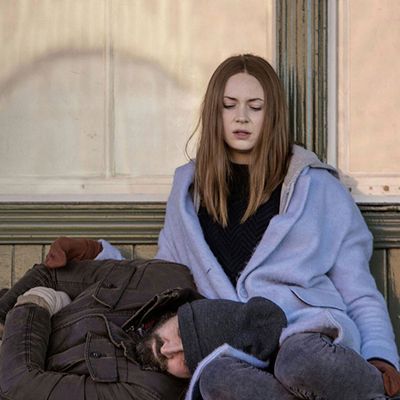
This review originally ran during the Tribeca Film Festival.
Even in the strange realm of directorial debuts by actors, The PartyÔÇÖs Just Beginning is an odd little movie. ItÔÇÖs written, directed by, and stars Karen Gillan, the Scottish actress who has catapulted from the Whoniverse to comedic roles in big-budget Hollywood fare over the last several years, but its only funny enough to draw you in so that it can then poke you in the eyes. A brutal, meandering depiction of a quarter-life crisis, GillanÔÇÖs script is staunchly resistant of silver linings or ÔÇ£it gets betterÔÇØ messaging. Its title, a would-be suicide-prevention slogan, comes off as a cruel joke when it flashes before the final credits.
Liusaidh (Gillan) is 24, still living with her parents in the small Scottish town of Inverness, with a dead-end job at a grocery-store meat counter. (That detail is among several that feel like a self-conscious homage to Lynne RamsayÔÇÖs 2002 Scottish quarter-life-crisis masterpiece Morvern Callar, daunting stuff to invite comparisons to.) Liusaidh spends her nights getting blotto at the local pub, often going home (or just to the alley) with strangers, then stuffing her face with fried food like a feral animal celebrating another kill. Played with numb resignation by Gillan, sheÔÇÖs a wandering void, her despair far past average 20-something hand-wringing about adulting. She also happens to have a recurring hallucination of her best friend jumping off of a bridge into an oncoming train.
It turns out that Alistair (Matthew Beard) has indeed taken his own life, though the whens and whys of it are kind of murky. I might just be too dense, but I didnÔÇÖt realize that The PartyÔÇÖs Just Beginning was operating in flashbacks, nor am I certain that my confusion on the matter wasnÔÇÖt by design. In retrospect, I can recognize that Gillan is more consistently dead-eyed in the present day than in the flashbacks, mostly because in the flashbacks she still has her friend around to take ecstasy and watch reality TV with. Between his addict father and his uncertainty about his sexuality and gender, Alistair is going through a rough, confusing time of his own; as told through LiusaidhÔÇÖs perspective, this mostly plays out in the background until it reaches a crisis point.
Perhaps other viewers will insist that AlistairÔÇÖs story would have been the more interesting of the two to follow, but weÔÇÖve probably seen that story before, and I rather admire the idea of a character so self-absorbed in her own garden-variety malaise that she doesnÔÇÖt realize that her friend needs her until itÔÇÖs too late. ItÔÇÖs a harder trick to pull off, and it feels real, as does the deep, dark regret that ensues. In the aftermath, Liusaidh finds herself in the accidental position of life coach to two suicidal strangers: One is another bar conquest (Lee Pace, charming as ever, but strapped with an awkward British accent); the other an elderly man who has mistaken her home phone for a hotline. (LiusaidhÔÇÖs parentsÔÇÖ number is apparently one off from the local suicide-prevention center; a detail that could have been its own twee Sundance film, but is mercifully not dwelled upon.) Suffice to say, there are a lot of ideas here, some of them more satisfyingly executed than others.
LiusaidhÔÇÖs bonds with her new friends donÔÇÖt work the way weÔÇÖre used to seeing in movies; after one has seemingly wrapped up in the best possible fashion, she hits rock bottom again. Again, I admire this resistance to moralizing, the filmÔÇÖs straight-faced acknowledgement that sometimes people get incurably sad, and even reaching out and forming an unlikely friendship with a stranger in an indie movie isnÔÇÖt going to be a remedy for your appreciation of life. There just isnÔÇÖt a whole lot of clarity on offer besides that ÔÇö narratively or cinematically. Gillan is so invested in her protagonistÔÇÖs interiority and murky morality that itÔÇÖs not entirely clear whatÔÇÖs actually going on from scene to scene, what the through lines are, what we should be invested in. Perhaps thereÔÇÖs never been a more accurate depiction of narcissism and depression.

